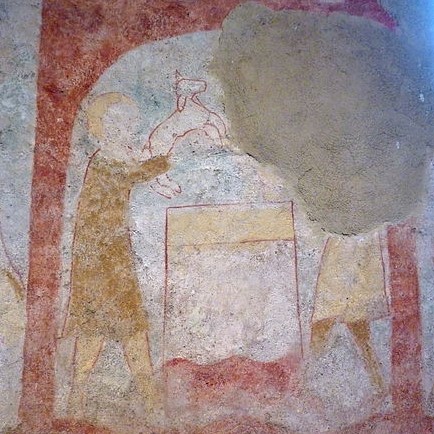
For a printable copy of this chapter (1) click here: 8.5×11″; A4 paper
Click here for a pdf of Genesis 4–11 in Redemptive History: 8.5×11″; A4 paper
.
.
4) Heb 11:4: “By faith a better sacrifice Abel than Cain offered to God.”
The author of Hebrews assumed that faith produces righteousness (Heb 10:37–39; Heb 11:6).[1]
Therefore, this verse begins a discussion of the spiritual posture of individuals from the book of Genesis who served as exemplars of faith (Heb 11:1–22).[2]
Jewish tradition typically focused upon the deficiency of Cain’s offering, rather than upon the acceptability of Abel’s.[3]
For example, Philo (20 BC–40 AD) noted that Cain brought young, inanimate things, while his brother offered strong and fat living sacrifices.[4]
.
.
However, some Jewish writings emphasized the piety of these two men as the differentiating factor.[5]
According to Josephus (37–100 AD), “Abel, the younger, was a lover of righteousness; and believing that God was present in all his actions, he excelled in virtue…but Cain was…very wicked.”[6]
A dichotomy between faith and works cannot exist (James 2:14–26).[7] Thus, Abel expressed his faith by his actions.[8]
The author of Hebrews cited him as the standard for those who desire favor with God (Cf. Prov 15:8–10). Indeed, “Through [faith], being dead, yet he speaks.”
This partially occurred due to the written record of Abel’s character.[9]
Yet, Heb 12:22–24 clearly specifies that Abel’s blood speaks,[10] but neither in conversation with others nor to himself.[11]
His blood cries out for justice (Gen 4:10).[12]
Image via Wikimedia Commons
.
Read Heb 11:4. According to the author of Hebrews, what made Abel’s offering superior to Cain’s? How does Abel still speak? What difference does knowing that make in your life?
.
.
.
Go to Oh, the Depth of the Riches of God! (Rom 11:33‒36)
[Related posts include A Servant of the Ground and a Shepherd of a Flock (Gen 4:2‒5); Misappropriated Blood (Gen 4:9‒10); Blood Given for You (Matt 26:26‒28); Pleading for Justice (Rev 6:9‒10); and The Full Number of Martyrs (Rev 6:11)]
[Click here to go to Chapter 1: A Tale of Two Brothers (Genesis 4:1‒16)]
.
[1]William L. Lane, Hebrews 9–13 (WBC; Dallas: Word, 1998), 335.
[2]George H. Guthrie, Hebrews (NIVAC; Grand Rapids: Zondervan, 1998), 375.
[3] Lane, Hebrews 9–13, 333.
[4]Philo, “A Treatise on the Sacrifices of Abel and Cain,” in The Works of Philo Judaeus (trans. Charles Duke Yonge; London: H. G. Bohn, 1854), 26–7, 227–8, https://archive.org/stream/worksofphilojuda01yonguoft#page/226/mode/2up.
[5] Lane, Hebrews 9–13, 333.
[6]Josephus, The Antiquities of the Jews, 1.2.1, http://www.perseus.tufts.edu/hopper/text?doc=Perseus%3Atext%3A1999.01.0146%3Abook%3D1%3Awhiston+chapter%3D2%3Awhiston+section%3D1.
[7]Paul Ellingworth, The Epistle to the Hebrews: A Commentary on the Greek Text (NIGTC; Grand Rapids: Eerdmans, 1993), 571.
[8] Guthrie, Hebrews, 376.
[9] Lane, Hebrews 9–13, 335.
[10]F. F. Bruce, The Epistle to the Hebrews, Rev. Ed. (NICNT; Grand Rapids: Eerdmans, 1990), 284.
[11] Ellingworth, The Epistle to the Hebrews: A Commentary on the Greek Text, 573.
[12] Bruce, The Epistle to the Hebrews, 283–4.
